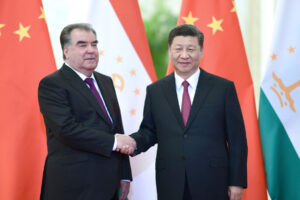The United States has embarked on the biggest industrial policy push in generations, dangling tax breaks, grants and other financial incentives to attract new factories making solar panels, semiconductors and electric vehicles.
That spending is aimed at jump-starting the domestic market for crucial products, but it has implications far outside the United States. It is pushing governments from Europe to East Asia to try to keep up by proposing their own investment plans, setting off what some are calling a global subsidy race.
Officials, particularly in Europe, have accused the United States of protectionism and have spent months complaining to the Biden administration about its policies. Governments in the European Union, in Britain and elsewhere are debating how to counteract America’s policies by offering their own incentives to attract investment and keep their companies from relocating to the United States.
“I think we all deny that there is a subsidy race, but up to a certain extent, it’s happening,” said Markus Beyrer, the director general of BusinessEurope, Europe’s largest trade association.
The United States is deploying nearly $400 billion in spending and tax credits to bolster America’s clean energy industry through the Inflation Reduction Act of 2022. Another $280 billion is aimed at facilities that manufacture and research semiconductors, as well as broader technological research.
The Biden administration says the full agenda will unleash $3.5 trillion in public capital and private investment over the next decade. It is both a response to the hefty subsidies offered by governments in China and East Asia and an attempt to rebuild an American factory sector that has been hollowed out by decades of offshoring.
ImageFredrik Persson, left, and Markus Beyrer, executives of BusinessEurope, a large trade group. “I think we all deny that there is a subsidy race, but up to a certain extent, it’s happening,” Mr. Beyrer said.Credit…Virginia Mayo/Associated Press
The administration says the investments will put the United States in a better position to deal with climate change and make it less dependent on potentially risky supply chains running through China.
But the spending has sparked concerns about taking government resources away from other priorities, and adding to the debt loads of countries when high interest rates make borrowing riskier and more expensive. Gita Gopinath, the first deputy managing director of the International Monetary Fund, said in an interview in October that the spending race was “a matter of concern.”
Ms. Gopinath pointed to statistics showing that whenever the United States, the European Union or China enacts subsidies or tariffs, there is a very high chance that one of the other two will respond with its own subsidies or tariffs within a year.
“We are seeing a tit-for-tat there,” Ms. Gopinath said.
The spending competition is also straining alliances by giving the companies that make prized products like batteries, hydrogen and semiconductors the ability to “country shop,” or play governments against one another other as they try to find the most welcoming home for their technologies.
Freyr Battery, a company founded in Europe that develops lithium ion batteries for cars, ships and storage systems, was partway through building a factory in Norway when its executives learned that the Inflation Reduction Act was under development. In response to the law, the company shifted production to a factory in Georgia.
“We think it is a really ingenious piece of modern industrial policy, and consequently, we’ve shifted our focus,” Birger Steen, Freyr’s chief executive officer, said in an interview. “The scaling will happen in the United States, and that’s because of the Inflation Reduction Act.”
Mr. Steen said the company was keeping the Norwegian factory ready for a “hot start,” meaning that production could scale up there if local policies become friendlier. The company is talking to policymakers about how they can compete with the United States, he said.
Some countries are reaping direct benefits from U.S. spending, including Canada, which is included in some of the clean energy law’s benefits and has mining operations that the United States lacks.
ImageCanada’s lithium industry stands to benefit as battery manufacturing moves to the United States and companies look for nearby sources of raw material.Credit…Brendan George Ko for The New York Times
Killian Charles, the chief executive at Brunswick Exploration in Montreal, said in an interview that Canada’s lithium industry stood to benefit as battery manufacturing moved to the United States and companies looked for nearby sources of raw material.
But in most cases, the competition seems more zero-sum.
David Scaysbrook, the managing partner of the Quinbrook Infrastructure Partners Group, which has helped finance some of the largest solar and battery projects in the United States, said that America’s clean energy bill was the most influential legislation introduced by any country and that other governments were not able to replicate “the sheer scale” of it.
“Other countries can’t match that fiscal firepower,” he said. “Obviously, that’s a threat to the E.U. or other countries.”
The United States has sought to allay some of its allies’ concerns by signing new trade agreements allowing foreign partners to share in some of the clean energy law’s benefits. A minerals agreement signed with Japan in March will allow Japanese facilities to supply minerals for electric vehicles receiving U.S. tax credits. American officials have been negotiating with Europe for a similar agreement since last year.
But at a meeting in October, the United States and Europe clashed over a U.S. proposal to allow labor inspections at mines and facilities producing minerals outside the United States and Europe. Officials are continuing to work toward completing a deal in the coming weeks, but in the meantime, the lack of agreement has cast a further pall over the U.S.-E.U. relationship.
Biden administration officials have continued to defend their approach, saying that the Inflation Reduction Act does not signal a turn toward American protectionism and that climate spending is badly needed. Even with such significant investments, the United States is likely to fall short of international goals for curbing global warming.
John Podesta, the senior adviser to the president for clean energy innovation, said in a conversation at the Brookings Institution in October that foreign governments had been doing “a certain amount of bitching.” But he said the U.S. spending had ultimately spurred action from other partners, including a green industrial policy that Europe introduced early this year.
“So with the bitching comes a little bit more shoulder to the wheel, so that’s a good thing,” he added.
ImageUrsula von der Leyen, president of the European Commission, presented the European Union’s Green Deal Industrial Plan in Brussels in February after the United States enacted the Inflation Reduction Act.Credit…Yves Herman/Reuters
In addition to the Green Deal Industrial Plan, which the European Union proposed in February, the bloc has approved a significant green stimulus program as part of an earlier pandemic recovery fund, and additional spending for green industries in its latest budget.
Japan and South Korea have proposed their own plans to subsidize green industries. In the technology industry, South Korea and Taiwan both approved measures this year offering more tax breaks to semiconductor companies, and Japan has been setting aside new subsidies for major chipmakers like TSMC and Micron.
Europe also proposed a “chips act” last year, though its size is significantly smaller than the American program’s. And China has been pumping money into manufacturing semiconductors, solar panels and electric vehicles to defend its share of the global market and prop up its weakening economy.
The competition has also given rise to anxieties in smaller economies, like Britain, about the ability to keep up.
“The U.K. is never going to compete on money and scale at the same level as the U.S., E.U. and China because we are firstly under fiscal constraints but also just the size of the economy,” said Raoul Ruparel, the director for Boston Consulting Group’s Center for Growth and a former government special adviser.
British officials have made it clear that they don’t intend to offer a vast array of subsidies, like the United States, and are instead relying on a more free-market approach with some case-by-case interventions.
Some economists and trade groups have criticized this approach and Britain’s resistance to creating a sweeping industrial strategy to shape the economy more clearly toward green growth, with the assistance of subsidies.
“The question is, do you want to capture the economic benefits along the way and do you want to tap into these sources of growth?” Mr. Ruparel asked.
ImageTSMC is building a $7 billion plant in Kikuyo, Japan. Japan has been setting aside new subsidies for major chipmakers like TSMC and Micron.Credit…Kyodo News, via Getty Images
Some experts insist fears of a subsidy race are overblown. Emily Benson, a senior fellow at the Center for Strategic and International Studies, said the scale of overall spending by the United States and the European Union was not significantly different, though European spending was spread out over time.
“I don’t see some huge kickoff to this massive subsidy race that will completely upend global relations,” Ms. Benson said.
Business leaders and analysts said the frustration in the European Union stemmed partly from broader economic concerns after the conflict with Russia. The combination of higher energy prices and tougher competition from the United States and China has pushed down foreign direct investment in Europe and sparked other fears.
Fredrik Persson, the president of BusinessEurope, said the companies his group represented had “a very strong reaction” to the Inflation Reduction Act.
“We fully support the underlying direction with the green transition, but it came at a sensitive moment,” he said.
Madeleine Ngo contributed reporting from Washington.
Source: The New York Times
















